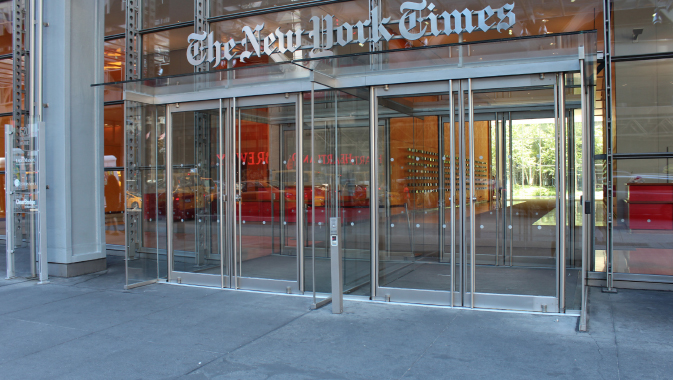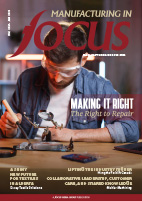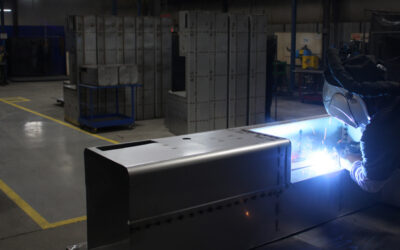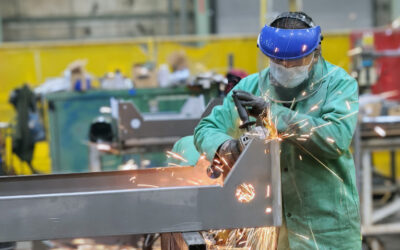After seventy-two years, Dawson Metal Company in Jamestown, New York is considered to be at the apex of the sheet-metal industry. This global manufacturer is fully invested in being the best and is equipped with the latest fabricating technology, professional expertise and innovation one would expect from such an industrial heavyweight.
~
Dawson Metal Company straddles three lines of industry, with sister companies Dawson Doors building high-end custom architectural entrances, along with Spray Tech Finishing Inc., a 50,000-square foot painting facility using wet and powder spray coatings, with assembly and shipping capabilities. Spray Tech also has a clean room facility for one of its biggest clients: lithography world leader ASML. This Dutch-based company has additional large operations in Connecticut and Taiwan that specialize in shrinking computer chips that run everyone’s electronic devices. Its state of the art machines range up to $100 million apiece, and Dawson Metal Company is one of its chosen parts fabricators for its debris-free, close-tolerance parts that are guaranteed to serve the demanding needs of its customer ASML.
“Dawson Metal Company is one of only a few fabricators globally who can accomplish the level of complex engineering and close-tolerance fabrication that our clients demand,” says David Dawson, the company’s president and Chief Executive Officer. “The company fabricates and forms metal into high-quality architectural products in our door division and custom enclosures in our industrial division. All aspects of our business specialize in solving challenging projects to meet customers’ specific and demanding requirements.”
Dawson’s entrances are featured in some of America’s most celebrated and historically significant buildings, including the U.S. Capitol and other federal government entrances across Washington DC including both the Senate and House buildings. In the past two years alone, Dawson has installed the entrances for five Smithsonian Museums, as well as Washington, DC’s recently opened Museum of the Bible.
Dawson has also had the honor of fabricating many prominent entrances for landmarks all over New York City. The Chrysler Building, Rockefeller Center, and some of the doors that fell with the World Trade Center in 2001 were Dawson Doors.
International noteworthy installations include the main doors at the US Embassy in Beijing, the home of the Emir of Qatar, and those of the King Fahd International Airport in Saudi Arabia and many others throughout the Middle East – the latest of which were twelve foot tall stainless steel doors for a new hotel in Riyadh. It has also done beautiful work in the United Kingdom, and one of its big clients, the Mormon Church, showcases several beautiful bronze temple entrances engineered and fabricated by Dawson Metal / Dawson Doors.
“Our architectural doors are so gorgeous and dramatic that they must be our best-known products,” says David. “Our industrial division has international clients including Fujitsu America, Bombardier, and Mitsubishi America. “It’s a global arrangement between French, Dutch, German, Japanese, and American companies, with us being the American company,” says David.
On the industrial side of its work, Dawson is famous for fabricating point-of-sale scanner enclosures for Fujitsu America. The familiar self-checkouts have swept America and are now catching on all around Europe. Many companies brand the enclosures to match their corporate colors which are painted at Spray Tech Finishing, Inc. for Dawson.
David’s grandfather arrived at Ellis Island in 1910, a Swedish youngster of fourteen. From there, he joined a large Swedish settlement in Jamestown, New York. He learned to speak English while working for a local sheet-metal company and started a family of his own. When his son, George, a navy captain and engineer, returned home shortly after the end of World War II, father and son went fishing one day and decided to join forces in business. They rolled up their sleeves and, in 1946, founded Dawson Metal Company in a 2000-square foot facility with five employees. The company initially made dishwasher enclosures and mailboxes, but a lot has changed since then.
When David joined his father and brother in the 1980s, Dawson’s main clients were IBM and Eastman Kodak, making up around sixty percent of its revenue at the time. However, the younger Dawsons were ambitious and had greater goals for the family business. They set out to reinvent the company. “We did this transformation through technology, and improving our overall capabilities – especially in engineering. Over time, we brought in the newest and latest technology in sheet metal fabrication and presented the company to the marketplace in a modern way,” says David. “My grandfather and father are long past, but I would give anything to walk them through Dawson Metal today and show them what we have become. We’ve not only reinvented ourselves once; we are doing it all the time,” he says.
The team is always looking for new ways in which to improve services and, as a result, now has a more diverse client base with more complex work than ever before and Dawson has never been busier. The family could not be prouder, especially as one of David’s sons is now one of the company’s technology drivers, moving the business forward at an ever-increasing pace which has become the vision for Dawson’s future.
Two of its latest additions are the phenomenal Amada fiber laser cutting system and the Romer A-7330 coordinating measuring machine (CMM) inspection arm. The former is a cutting-edge electrically powered laser that is twice as fast as its predecessor, translating into higher quality, faster parts production with a greater accuracy. This is the company’s fifth laser and offers phenomenal, computerized precision that results in the level of near-impossible close tolerance demanded by Dawson’s discerning clientele. It is a far cry from the days when engineers worked strictly off blueprint drawings.
“We still are seeking quality sheet metal employees to join our team which today totals one hundred members. But instead of the old days where twenty percent of the work happened in engineering, now eighty percent of it is done on various computer screens that end up driving most of our floor equipment,” says David.
The second of its latest tools is the Romer inspection arm, a portable instrument that has revolutionized the quality control process. Instead of a human quality controller lining up and expertly eyeballing each part, this machine measures any size part against a digital rendition that exactly matches the client’s quality requirements. This capability makes quality measurements infinitely more accurate, especially where close tolerance is of the utmost importance. This has significantly improved the success rate and the time it takes in controlling parts’ quality and costs.
For example, the company is currently in the process of developing a high-tech locker system for New Jersey-based Tiburon Lockers Inc. The product has taken the market by storm. The lockers are used by recreational facilities like ski resorts and water parks. Dawson initially expected to do around $300,000 of work for Tiburon in 2018. But as it turned out, that level was to become the first quarter’s work alone, as Tiburon continues to capture market share.
When it comes to patent ownership, David is clear. “Most of the time the patent remains with the client, and we have various types of confidentiality agreements in place. On occasion, we design one hundred percent of a unit, therefore we own it. But that is not the norm,” he says.
Dawson sometimes undertakes the risk and cost of fabrication design on the client’s behalf, like with the Los Angeles-based Maya Labs Inc. They market the latest automated teller machines (ATM) technology that is being introduced to the market. The brand new ATMs have multiple functions, and while the technology is all Maya’s work, Dawson Metal Company designed and is fabricating the enclosures for the machines. It has shipped fifty to date and is looking forward to the product changing the way in which we use ATM banking.
Dawson Metal Company has certainly made projects like Tiburon and Maya its focus by becoming the clients’ primary engineering resource. In a bid to cut excess costs, many companies have realized that the engineering of their parts is better suited to fabricators that have a better-rounded understanding of the overall process. The company therefore takes the pressure off its clients by providing a complete engineering and fabrication arrangement. Technology is the big driving force behind this company, and Dawson management is committed to providing its great team with leading engineering technology to serve the needs of existing and potential customers.
“As far as future projects are concerned, we are starting to market high-security ballistic walls and doors to help create ‘hardened’ facilities for schools, police stations and other large public buildings to prevent, restrict, and mitigate possible armed attacks. We’re going to offer these hardened doors, walls, and windows to protect kids and police officers, and any office in the world where people believe they’re a potential target,” says David. “What we offer, as opposed to most others, is a custom-made, beautifully designed series of products. When we deck out a facility, it’s gorgeous. We feel that’s a huge potential market going forward,” he says.













